
4
LIVE KNOTWEED JOBS IN Arnold
22
SUCCESSFUL KNOTWEED REMOVAL PROJECTS IN Arnold
100%
SUCCESSFUL PROPERTY SALES AFTER TREATMENT
5
Arnold BASED KNOTWEED STAFF
Japanese Knotweed Removal in Arnold
Knotweed Services is a Japanese knotweed company based in the Midlands region, but with service offices in Arnold. We are well-versed in the complexities of Japanese knotweed removal, control, and treatment in and around Arnold and England.
Knotweed Services is a PCA member, a government-approved trade body for “the damp, waterproofing, wood preservation and invasive weeds industries.” If you have a knotweed problem, we’ll take care of it for you.
Knotweed Services has successfully controlled many large knotweed infestations in and around Arnold and England. For effective knotweed control to occur, thorough identification, surveying, treatment, and monitoring are necessary.
Reasons to use Knotweed Services
Japanese knotweed is one of the most aggressive plants in the UK. It spreads quickly and has the potential to damage buildings, homes, and other property. At Knotweed Services, we conduct detailed surveys to detect how invasive your Japanese knotweed is. We provide detailed quotes and plans, giving you an accurate assessment of the situation and recommendations for any necessary action.
If you’re a commercial land or property owner and Japanese Knotweed is present, your project may end up being delayed until or whilst your infestation is being dealt with correctly and legally.
Japanese Knotweed, a very troublesome weed
- Japanese knotweed can grow through tarmac and concrete, threatening your building’s integrity.
- Lenders often refuse mortgage loan requests if Japanese knotweed is found on the property.
- Knotweed can grow so large and fast that it obstructs visibility and access to structures, such as paths, highways, and building facades. Knotweed can also be bothersome for commercial properties because it crowds out desirable crops.
Knotweed Services offers a guarantee against re-infection for customers in Arnold who have Japanese Knotweed. We will remove the plant in its entirety and transfer it to a disposal site.

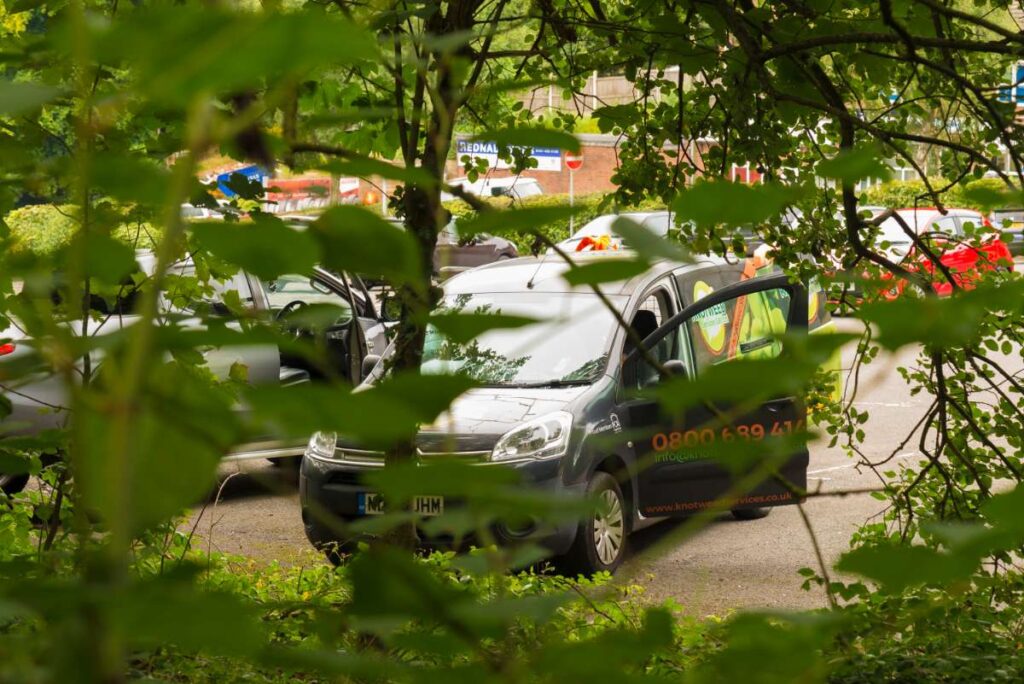

FREE IDENTIFICATION
Fill in the form below, attach your pictures and we’ll let you know if the plant in your picture is Japanese Knotweed.
Call Knotweed Services ASAP to start the treatment and control of your infestation in Arnold
Call us on: 0121 725 6348 or 0800 689 4146 for an immediate quote
Once you contact us, the Knotweed team will help you navigate the process.
RESIDENTIAL JAPANESE KNOTWEED REMOVAL Arnold.
WHAT YOU NEED TO KNOW ABOUT JAPANESE KNOTWEED REMOVAL Arnold
As different infestations of Japanese Knotweed vary from property to property, it is not surprising that treatment and control will too. A single method of removal or a combination of methods may be required to get rid of the plant.
Since Japanese knotweed is a natural phenomenon, our experts will consider site-specific factors when making treatment decisions. An insurance-backed guarantee is available.
— JAPANESE KNOTWEED REMOVAL OPTIONS AVAILABLE IN Arnold
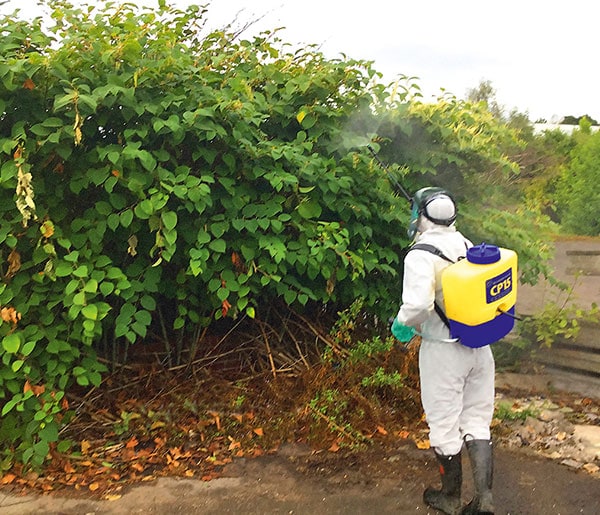
FOLIAR SPRAYING *
Most common treatment. The spraying of powerful chemicals with a knapsack. We ensure that other plants aren’t damaged. The most effective time for foliar spraying to Japanese Knotweed is in Spring

FOLIAR LEAF WIPING *
With this Japanese knotweed treatment we employ a device to ‘physically wipe’ our chemicals onto the Japanese Knotweed leaves. This application is so precise that we can often use a higher concentration of chemical.

STEM INJECTION
We apply a controlled amount of herbicide directly into the invasive weed. Due to being injected directly into the Japanese Knotweed, this is the most crafty method of removal. It isn’t dependent on the weather.
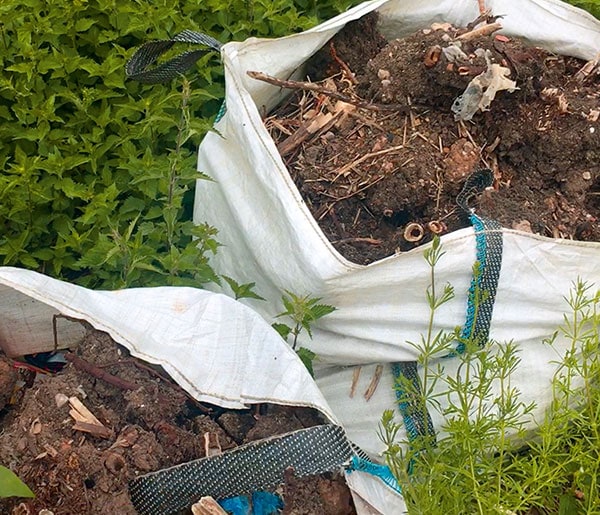
BIOMASS REDUCTION
Biomass is a form of excavation and removal but instead of extracting all of the soil impacted by Japanese Knotweed, we only remove the infested parts of the soil. It’s an excellent Japanese Knotweed control method that allows the reuse of the soil. Reducing the use of landfill.
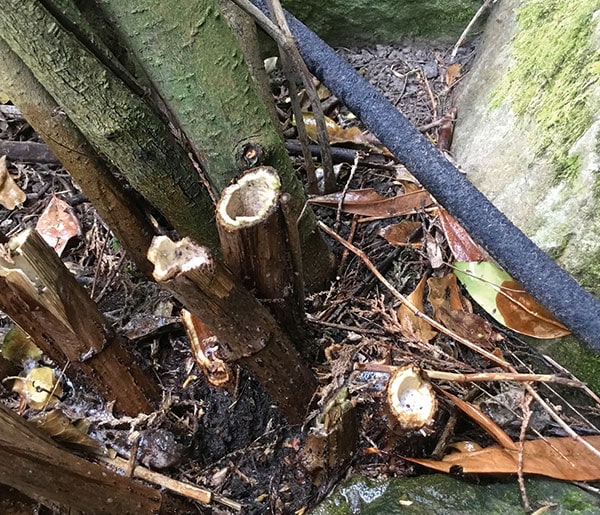
CROWN REMOVAL
Crown and stems are capable of regenerating and even small fragments of cut crown or stem are capable of regenerating and becoming a new invasive weed – removing these from the equation is a great strategy.
— TREATMENT OPTIONS AVAILABLE IN Arnold
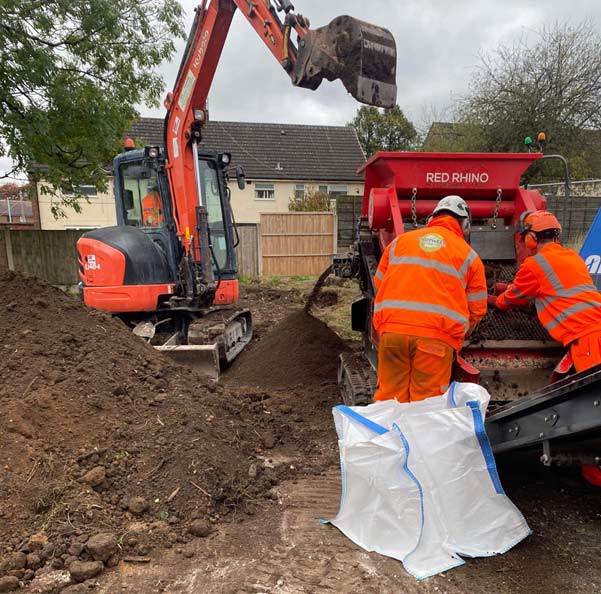
SOIL SCREENING
A tried and tested methodology used on hundreds of sites across the UK.
Using the screening method, the Japanese knotweed rhizome material is separated from the soil material. The Japanese knotweed material is then either transported to licensed landfill at a much lower disposal rate or incinerated on site using a D6 exemption from the Environment Agency or Natural Resources Wales.
The cleaned soils can then be reused in locations away from any construction, normally in soft landscaping areas.
This can reduce the landfill & backfill requirement costs significantly and can also help to reduce the carbon footprint on site due to reduced vehicle movements to landfill.

BIOSECURITY SUPERVISION
Knotweed Services can provide a biosecurity operative to supervise any excavations and movement of soils containing Japanese knotweed on site.
As part of these measures, we can provide a biosecurity boot wash and machine-washing area installed in an area at the entrance to the site.
We will provide all toolbox talks for the main contractor on site, which will be signed by all contractors involved in the operation on site.
We can provide temporary geotextile barriers if required in areas to maintain the biosecurity on site.
Once the works have been completed, we will provide the client with a full biosecurity report.
This method can be used in conjunction with other treatment methods on site.

EXCAVATION AND DISPOSAL
This treatment method is ideal where time constraints are present and there’s no other option other than to remove both the Japanese Knotweed and contaminated soil to a registered landfill.
By removing all traces of the infestation quickly, this offers a rapid solution to your problem and allows your commercial project to begin groundwork’s almost straight away. When time is of the essence, there is no quicker Japanese Knotweed removal/treatment method.
Any waste taken off-site will be done so with a licensed waste carrier to a suitably authorised landfill site.

CELL BURIAL
Cell burial comprises of moving Knotweed contaminated soil from one location on site, burying it in an excavated pit which is lined with a root barrier membrane, in a different position on the site.
The burial requirements for Japanese Knotweed are as follows:
- The Environment Agency recommends that the top of the burial cell should be a minimum of 2 metres below ground level.
- The overall depth of the burial pit should be in excess of 5 metres deep. All root barrier seams are welded together forming an encapsulated cell from which the Japanese Knotweed cannot escape. Clean soil is then used to backfill on top of the cell.
- To prevent accidental disturbance of the burial site, it is recorded on all site plans and future land owners should be made aware of the location.

STOCKPILE & TREAT
Bunding is the method of relocating contaminated Japanese Knotweed soil to a different area of the site being treated. A bund is a shallow area of the contaminated soil, typically 0.5m deep.
The bund can either be raised, on top of the ground, or placed within an excavation to make the surface flush with the surrounding area.
The purpose of the bund is to move the Japanese Knotweed to an area of the site that is not used. This ‘buys time’ for treatment that would not be possible where the Japanese Knotweed was originally located.

HERBICIDE APPLICATION
At Knotweed Services we can provide the client with bespoke treatment plans depending on the locations of the Japanese knotweed.
These plans can work in conjunction with other methods of treatment where access is limited to pedestrian movements i.e., embankments or existing pathways within a site.
This will normally consist of up to 3 visits per annum to apply herbicide by either foliar spray technique or stem injection during the growing season over a period of 3 years, with a monitoring period of 2 years thereafter.
We would select the appropriate herbicides depending on the surrounding foliage or environmental constraints.
After each visit a full treatment record would be provided with photos showing the progress of the works and then an annual report.
Services available throughout the UK:
- Durham
- Blackburn
- Blackpool
- Bolton
- Burnley
- Bury
- Chorley
- Durham
- Barnsley
- Bishop’s Cleeve
- Bridgnorth
- Isle of Wight
- Kendal
- Ludlow
- Maidstone
- Scarborough
- Staple Hill
- Totton
- Wakefield
- Winchester
- Durham
- Aylesbury
- Battersea
- Braintree
- Epping
- Morley
- Yate
- Fylde
- Hyndburn
- Bromyard
- Chalford
- Chelmsford
- Dawley
- Grasmere
- Huntingdon
- Ilkeston
- Ashford
- Barnet
- Coleford
- Kington
- Whitchurch
- Wigtown
- York
- Market Drayton
- New Alresford
- New Mills
- Portsmouth
- Rush Green
- Telford
- Winterbourne
- Workington
- Corby
- Creetown
- Clevedon
- Colchester
- Daventry
- Doncaster
- Emsworth
- Gillingham
- Gosport
- Huddersfield
- Lydney
- North Wingfield
- Shropshire
- Swadlincote
- Whitehaven
- Winchcombe
- Wirral
- Withernsea
- Yeovil
- Falmouth
- Folkestone
- Harlow
- Higham Ferrers
- Bedford
- Biggleswade
- Camborne
- Fyfield
- Kirklees
- March
- Northallerton
- Kettering
- Leominster
- Madeley
- Basildon
- Newport
- Thornbury
- Wellington
- Wharton
- Wotton-under-Edge
- Abingdon-on-Thames
- Accrington
- Acton
- Aldershot
- Aldridge
- Altrincham
- Ambleside
- Barnsley
- Bath
- Bishop’s Waltham
- Burton Latimer
- Fareham
- Harrogate
- Clacton-on-Sea
- Desborough
- Fleet
- Glastonbury
- Glossop
- New Milton
- Oswestry
- St Ives
- St Neots
- Truro
- Whitchurch
- St Helens
- Waterlooville
- Yateley
- Andover
- Bedfordshire
- Kent
- Cheshire
- Leeds
- Kent
- Darlington
- Dartmouth
- Durham
- Eaton Socon
- Essex
- Exmouth
- Gateshead
- Durham
- Hartlepool
- Herefordshire
- Hull
- Banbury
- Canterbury
- Hampshire
- Lancashire
- Merseyside
- Durham
- Rothwell
- Stonehouse
- Sunderland
- Tetbury
- Kent
- Middlesbrough
- Newcastle upon Tyne
- Durham
- Radstock
- Redcar
- Sefton
- Calderdale
- Dursley
- Havant
- Penrith
- Petersfield
- Richmond
- Stockton-on-Tees
- Tewkesbury
- Tonbridge
- Wellingborough
- Ringwood
- Romsey
- Sandy
- Basildon
- Downend
- Greater Manchester
- Lymington
- Newquay
- Northampton
- Soham
- Stockbridge
- South Benfleet
- Edmonton
- Ely
- Hedge End
- Brackley
- Filton
- Ilfracombe
- Knowsley
- Royal Tunbridge Wells
- Southampton
- The Town
- Winsford
- Stroud
- Durham
- Alton
- Bakewell
- Fordingbridge
- Hereford
- Ashurst
- Bordon
- Bradford
- Bridgwater
- Chester
- Cinderford
- Halifax
- Ross-on-Wye
- St Austell
- Whittlesey
- Leighton Buzzard
- Loftus
- Macclesfield
- Margate
- Yaxley
- Basingstoke
- Carlisle
- Ellesmere Port
- Flitwick
- Gloucester
- Barking
- Brighton
- Crewe
- Dogsthorpe
- Herne Bay
- Luton
- Nailsworth
- Paignton
- Peterborough
- Rotherham
- Tiverton
- Weston-super-Mare
- Kingswood
- Plymouth
- Rushden
- Shefford
- Sittingbourne
- Bradford
- Buxton
- Chard
- Exeter
- Torquay
- Ashton-under-Lyne
- Barrow-in-Furness
- Farnborough
- Innsworth
- Ledbury
- Portishead
- Runcorn
- Warrington
- Burnham-on-Sea
- Chatteris
- Long Eaton
- Shifnal
- Tadley
- Widnes
- Lancaster
- Oldham
- Durham
- Pendle
- Durham
- Preston
- Durham
- Ashford
- Batley
- Brentwood
- Dartford
- Gravesend
- Keynsham
- Matlock
- Penzance
- Taunton
- Whitstable
- Chesterfield
- Dewsbury
- Eastleigh
- Frome
- Nailsea
- Saltash
- Southend-on-Sea
- Whitby
- Ribble Valley
- Rochdale
- Rossendale
- Salford
- Durham
- Durham
- Stockport
- Tameside
- Trafford
- Durham
- Wigan
- Durham
